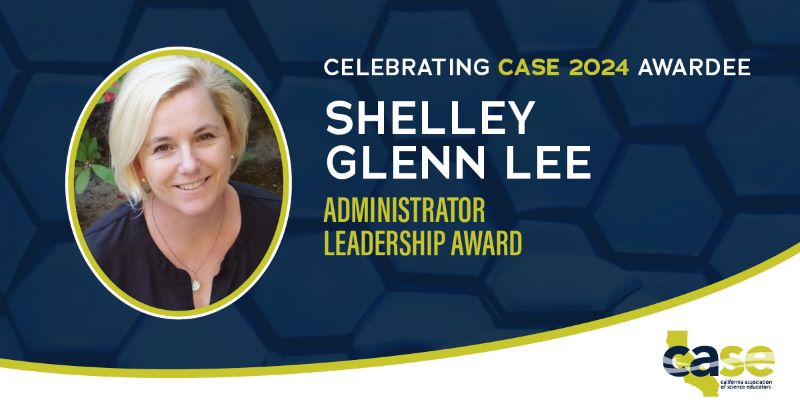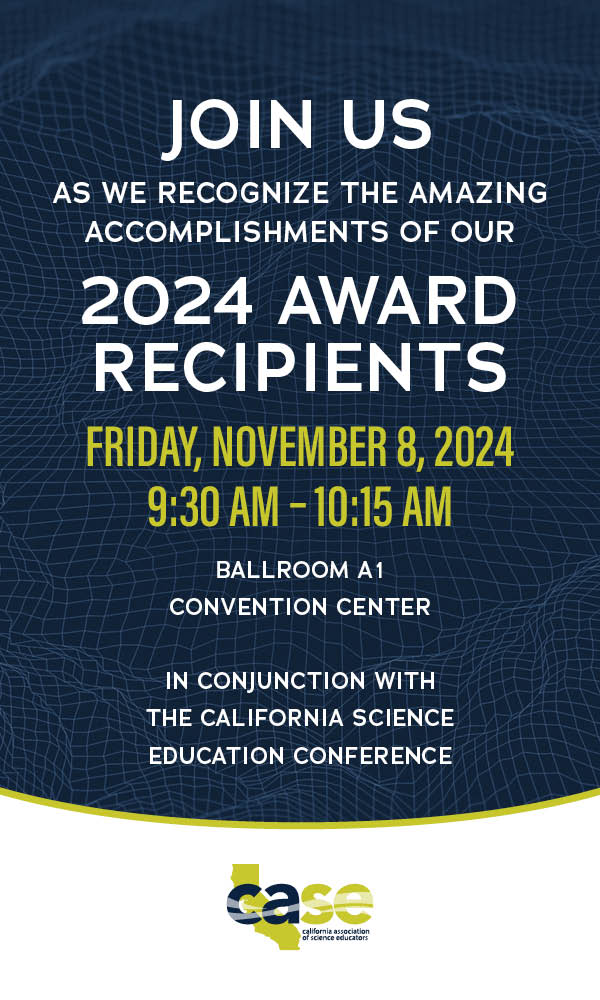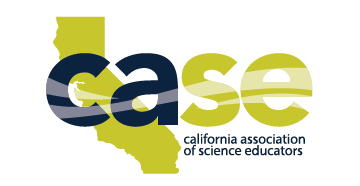
Administrator Leadership Award: Shelley Glenn Lee
Meet Shelley Glenn Lee
I am very humbled and honored to have been given this award. It means so much that my colleagues nominated me and I very much appreciate CASE for being an organization that acknowledges and celebrates teachers and administrators working to improve science education around the state. Being a school leader is a huge responsibility and quite an honor. As I mentioned previously, giving up teaching science for an administrative level position was a huge decision for me. This award makes me feel appreciated and empowered as a leader to continue to make meaningful contributions to science education. Thank you so much!

When the opportunity to become a School Director presented itself, it was a very big deal to me to give up my dream job as an elementary science teacher. My school has allowed me to create a culture in which science is valued and integrated into projects at all grade levels. While I miss being in the classroom, being an administrator has allowed me to open up opportunities for others while continuing to champion science across multiple platforms. I am committed to building teacher capacity through professional learning, collaborative design, and shared leadership. By cultivating a culture of collaboration and continuous improvement, we not only model for students how to work together, but also how to give as well as receive critical feedback as we revise our thinking and improve our work.
Collaboration is the cornerstone of my philosophy of leadership. I am committed to providing the time, space, and resources for my staff to collaborate on project design and plan for inclusive teaching practices. Through professional collaboration, we can build on each other’s strengths, creating rigorous and engaging learning experiences for all students. By bringing students and families into the process, I believe we build and strengthen our community, ensuring that the work we are doing is relevant and meaningful to all students. To elevate our project work, we seek opportunities for collaboration with community partners who provide expertise and fieldwork experiences that empower our students with personal knowledge.
Can you describe your vision for science education when you first started at High Tech Elementary, North County? How has that vision evolved over the years?
I first started at High Tech Elementary North County in 2013, as a science teacher, after having taught for many years at the Birch Aquarium at Scripps and UC San Diego where I worked directly with scientists to integrate their research into educational experiences for people of all ages. I saw how powerful it was for students to learn science out in the field, connect with real scientists, and experience science through hands-on activities. With High Tech’s approach to Project Based Learning, I was allowed to design my own curriculum and integrate these approaches into elementary science. I felt strongly (and still do!) that ALL students, even the youngest ones, deserve authentic learning experiences that connect them to the world and engage them in the nature and process of science.
Through participation in the CA NGSS Early Implementers Initiative, my colleagues and I worked on integrating the new standards into our projects. I appreciated the push to make science lessons 3-dimensional, where content was learned through scientific practices and connected to larger interdisciplinary concepts. The experience of deeply engaging with the standards helped my colleagues and I identify areas in which we could integrate math and literacy to enhance the relevancy of the content and experiences of our students.
My vision for science education continues to be student-centered, designed and implemented through collaboration with the community, allowing students to actively engage in scientific inquiry that is locally and personally relevant to their own lives. In order to have top notch science education, we need to support teachers and other educators with frequent, high quality professional learning that empowers them to embrace science, facilitate inquiry, and integrate community. We need to provide support, time, and resources to develop and refine their practice. It is a challenge, particularly in elementary schools, where teachers are expected to teach foundational literacy and math skills and where much of the professional learning and resources are dedicated. We need to continue to utilize science, which is naturally engaging to young students, as a platform in which they can develop their reading, writing, and math skills in a meaningful context.
What drives your passion for science education, and how do you inspire others to share this passion?
As a high school student, I found my calling while on a field trip to the “floating classroom” during which we learned a multitude of techniques for collecting and studying marine organisms. It was the moment I realized that my personal interest in the ocean was actually a career possibility–something that I had not considered before. I immediately exclaimed to my family that I wanted to be a marine biologist, and I then pursued my passion, becoming the first in my family to earn a college degree. I was able to work as a research diver, traveling and living in tropical places studying marine ecology. I then had the privilege to work as an educator at Scripps Institution of Oceanography where our mission was to translate current scientific research into experiences for the public. I have since committed myself to improving science education around San Diego County and beyond.
I have always loved my work as a science educator, and when I began to reflect on my career path and issues of equity and inclusion in science, I realized how incredibly important that one field trip was for me in determining my life’s trajectory. If I had not been in an advanced biology class, that field trip would never have happened and I likely would not have had the opportunity to find my passion so early, if at all. Because of this, I make every effort to support field experiences for all students, particularly those who may not otherwise have access to such opportunities. High quality science education is an equity issue and I firmly believe that all students, no matter their socioeconomic status, family background, or perceived academic potential deserve resources and opportunities to engage in science and develop into scientifically literate citizens.
As a teacher, I ensured that all my students, every year, participated in field experiences that exposed them to the natural world and to professionals working in the sciences. I helped families participate in these experiences, exposing them to new places and people that they could visit on their own. I offer to teach my colleagues about science content and demonstrate scientific protocols and practices so they can build their own skills and confidence in teaching science. As an administrator, I continue to help my teachers identify opportunities and provide resources for them to get our students outside, connected with the community, and engaging in authentic and meaningful science.
What are some of the most significant successes and/or challenges you’ve encountered while helping teachers understand and implement the NGSS standards?
Through the K-12 California Early Implementers Initiative, I was privileged to participate as a teacher leader in learning NGSS. Along with other teachers in my organization, we facilitated many lesson studies and professional learning opportunities for our colleagues in grades K through twelve. When designing and teaching 3-dimensional lessons, we found that focusing on the Science and Engineering Practices helped ensure we were engaging students in the nature and process of science. For those who learned and began teaching with the old state science standards, it was challenging to move beyond what science students needed to merely “know” and integrate ways in which scientists “do” their work, while also considering concepts that connect science with other disciplines. Ensuring that lessons are 3-dimensional has continued to be challenge, however, when done with fidelity, we get better student learning outcomes. Another challenge that keeps us on our toes and is critical to authentic learning is identifying local phenomena that relate to the standards. Supporting teachers in this work requires much time and effort but is well worth it in the end and personally I very much enjoy this challenge! I appreciate working with those who are open to new ideas and willing to try something that may be unfamiliar to them!
Quick Links
Exhibit Partner Package
Opening Soon
Join us at the 2025 California Science Education Conference, the premier event for science educators across California! This gathering is your chance to showcase your products, engage with educators, and maximize your impact through our exclusive Partner Program.


